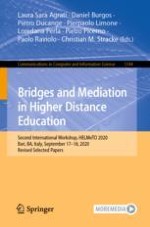2021 | Buch
Bridges and Mediation in Higher Distance Education
Second International Workshop, HELMeTO 2020, Bari, BA, Italy, September 17–18, 2020, Revised Selected Papers
herausgegeben von: Laura Sara Agrati, Prof. Dr. Daniel Burgos, Pietro Ducange, Pierpaolo Limone, Prof. Loredana Perla, Prof. Pietro Picerno, Paolo Raviolo, Christian M. Stracke
Verlag: Springer International Publishing
Buchreihe : Communications in Computer and Information Science
